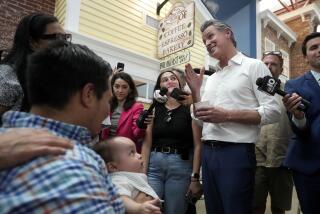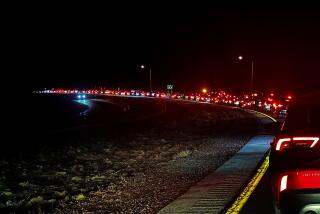Despite Organization and VIP Support, Bush Faces Uncertainty in New England
- Share via
GREENFIELD, N. H. — The last of five Marine Corps helicopters bearing Vice President George Bush and his campaign brigade settled onto an expansive lawn, its blades fanning the brilliant red and gold leaves of autumn trees, and the candidate himself emerged to the cheers of 3,000 people who strained against security ropes to be near him.
For the next two hours, George Bush shook hands and slapped backs, hollered “great day” to old friends and basked in the glory of a political gathering that left his aides convulsed with delight.
But even on Saturday, a day roaring with optimism, Bush grew pointedly defensive when he mounted a podium bedecked with hay bales and bright orange pumpkins.
“Yes, I’m vice president and yes, I’m proud to have been vice president and yes, I have served hopefully with loyalty a President that I respect,” he said, biting off each word. “And I was there when the going was tough as well as . . . when things were going swimmingly.
“Why? Because I learned something as a Navy pilot many years ago. You don’t cut away. You don’t leave the squadron leader as a wing man and pull off, protecting your own self when the flak gets heavy. And I didn’t and I stood with him and I have no regrets.”
It was George Bush’s tacit acknowledgement of his biggest problem, the unsettling feeling of some voters here that they don’t quite know what George Bush himself has stood for all these years when his beliefs were submerged under Ronald Reagan’s, and they don’t quite know if he has the strength to match the presidency.
In a quick weekend trip to New England that concluded months of informal campaigning, Bush took pains to embrace regular folks, extol his governmental experience and allude, though with few specifics, to his plans for the presidency.
His formal bid for the Republican nomination begins today with a Houston announcement speech that will kick off a weeklong, cross-country round of stumping by the vice president and his family.
Although bedrock Republican New England audiences fawned over Bush in his weekend appearances, the signs in New Hampshire, site of the nation’s first presidential primary next Feb. 16, are not all as positive as the Greenfield appearance indicated.
In New Hampshire, Bush heads what appears at first blush to be a broad and confident organization, gathered by years of consistent efforts that began even as Bush drowned in Reagan’s surging victory in the 1980 primary here.
On paper, Bush virtually controls the state’s Republican hierarchy. He captured the endorsements of New Hampshire’s third-term governor, one of its two congressmen, eight of its nine Republican sheriffs and more state legislators than any other Republican contender.
“He’s like a public utility,” moaned Paul Jacobson, spokesman for Bush’s competitor, Kansas Sen. Bob Dole. “He’s everywhere.”
Pleased With Efforts
Bush campaign officials declare themselves pleased with their New Hampshire efforts.
“He has demonstrated that with the Iran- contra hearings, Doonesbury (which has lampooned Bush repeatedly) and the other negative publicity--despite that, our numbers have held,” said Ron Kaufman, Bush’s New England coordinator.
But many Republican activists have disconcerting doubts about whether this impressive organization will produce what really counts--votes next February.
“He’s gotten a lot of elected officials, all important elected officials,” said Betty Tamposi, a real estate developer who is uncommitted thus far. “But when push comes to shove, all Ronald Reagan had (in 1980) was the grass roots. He had the dogcatchers, the gas station attendants, the people without big-shot positions. Those are the people that get you elected.”
A statewide poll in early September showed Bush with a commanding lead over his rivals, but 37% of likely Republican primary voters remain undecided, and Bush’s support, the pollster warned, was thin. Only 9% said they would refuse to vote for him, the New Hampshire Poll found, but only 35% said they favored Bush, indicating a sea of voters ambivalent about the vice president.
Holds 35% Support
Bush’s vice presidency grants him an international presence--at three New England stops Saturday he reminded voters of his recent nine-day journey to Europe. But it also hampers his ability to engage in the retail politics that voters here have come to expect.
At the Fryeburg, Me., fair, where Bush presented a blue ribbon to Brenda Theriault for her championship 1,200-pound baby black Angus steer, Secret Service agents ringed him; black bullet-proof limousines and state trooper cars littered the fairgrounds. In Greenfield, attendance at Rep. Judd Gregg’s Bush gathering was invitation-only because of security concerns. “He obviously can’t go up to New Hampshire . . . talk to a family of five and get 20 votes,” said a high-ranking Bush official. “We come into Nashua and tie up traffic for an hour and everyone in town is mad at Bush.”
Among many voters too, Bush continues to be stalked by image problems that have cost him supporters around the country. Discomfort with his preppy persona and ambiguous role in the Reagan presidency have left some with doubts.
“A lot of people wonder what Bush does,” said Janet Doty, an undecided Lee, N. H., voter who attended a recent Republican gathering. “You wonder how much he has input into the decisions that affect us.”
Bush’s chief competition, as in other areas of the country, comes from Dole. Paradoxically, as Bush tries to convince voters he is forceful enough to be President, Dole is seeking to soften his image. The Senate minority leader has spent the last three weekends in New Hampshire buttering up audiences with a speech enunciating his small-town Russell, Kan., beginnings, a subtle jab at Bush’s more aristocratic youth.
“I got here today because a lot of people along the way said, ‘Well, he’s a pretty good guy; I’m going to help him out’ and they did,” Dole told an audience of 300 realtors gathered near Manchester recently. “And I try to remember as I’m going up that ladder to look back now and then to see who may be down there trying to find that ladder, trying to find the first rung.
“Maybe they’re disabled,” he thundered. “Maybe they’re black. Maybe they’re brown. Maybe they’re white. Maybe they’re hungry. Maybe they’re homeless. . . . They’re Americans. They are people who live in New Hampshire and Kansas and Manchester and Russell. They are just like the rest of us, except they haven’t made it.”
With his distinctly Democrat-like speech, Dole is trying to attract not only Republicans but also independents, who make up one-third of the New Hampshire electorate and can cast votes for either party on primary day.
Bush campaign officials bridle at suggestions that voters have not firmly committed to the vice president, pointing out that he remains the front-runner. But they acknowledge that Bush, like his Democratic counterpart, Massachusetts Gov. Michael S. Dukakis, will have to win big in New Hampshire to avoid the perception that he has lost ground.
“The way to lose New Hampshire is not on votes,” said Kaufman, Bush’s New England coordinator. “It’s on expectations.”
More to Read
Get the L.A. Times Politics newsletter
Deeply reported insights into legislation, politics and policy from Sacramento, Washington and beyond. In your inbox twice per week.
You may occasionally receive promotional content from the Los Angeles Times.











